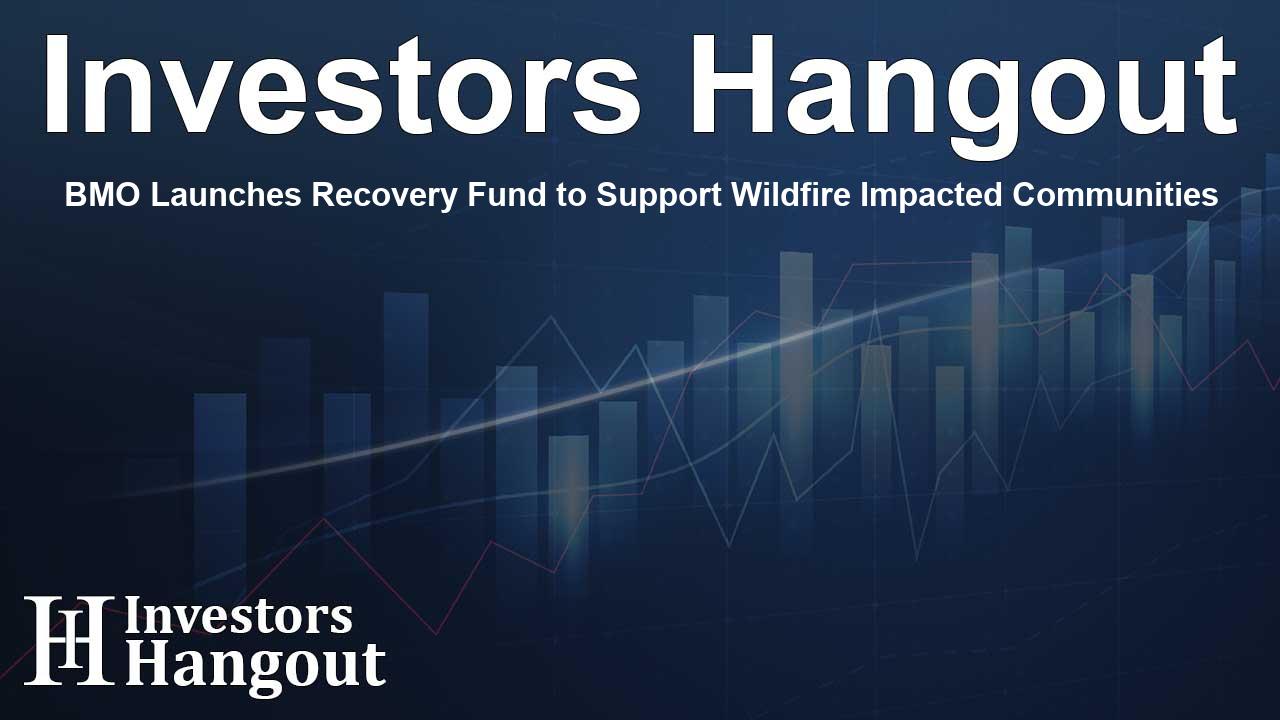BMO Launches Recovery Fund to Support Wildfire Impacted Communities

BMO Launches Recovery Fund to Support Wildfire Impacted Communities
BMO has announced that the BMO Wildfire Recovery Fund is officially accepting applications, dedicating a substantial $3 million towards recovering efforts for communities impacted by recent devastating wildfires. This initiative aims to bolster recovery for individuals, families, and communities facing the repercussions of these natural disasters.
The funds will primarily support nonprofit organizations that work in critical areas of recovery. This includes a strong focus on services that help people rebuild their lives and communities after the wildfires. A highlight of the BMO Wildfire Recovery Fund is its intention to support small businesses and homeowners in navigating the recovery process.
Helping Individuals and Families
The fund is designed with the objective of assisting individuals and families significantly affected by the wildfires. This component emphasizes programs that enable residents to not only recover but thrive in their rebuilt communities. Specific services funded will assist residents in navigating administrative requirements, which can often be a complex hurdle during recovery.
Accessing Essential Mental Health Support
The recovery process can be emotionally taxing, often requiring mental health support. The fund will therefore also finance initiatives that provide mental health resources for those who have experienced trauma due to the wildfires. Community-driven activities, such as information sessions, will help bring together local agencies and residents to provide necessary support.
Rebuilding Community Infrastructure
In addition to individual recovery, BMO is committed to funding community rebuilding efforts. The recovery focus will extend to enhancing safety, addressing food insecurity, and rebuilding essential community assets. The strategies underpinning this initiative aim at restoring not just homes but the fabric of local neighborhoods.
Addressing the Needs of Communities
Programs will include efforts towards ensuring access to healthcare, education, and shelter. Additionally, community infrastructure will be prioritized, with funds allocated to rebuild community centers, parks, and public spaces that serve as gathering points for resilience and recovery.
Long-term Commitment to Community Engagement
BMO's commitment to community growth reflects its broader operational ethos of supporting thriving communities. The Wildfire Recovery Fund signifies an investment in long-term relationships within affected communities. The bank’s efforts are not limited to financial contributions; they also include actively encouraging employee volunteer work and further philanthropic initiatives.
Employee Involvement and Contributions
BMO's dedication is underlined further by the over 54,000 hours its employees volunteered in communities amid challenges over the past year. Employees were behind significant donations, contributing more than $28.7 million towards community initiatives through specific giving campaigns. This endeavor is part of a larger mission to foster positive change and ensure all communities can thrive, particularly after hardships like the wildfires.
Inviting Application for Funding
Nonprofits working in the previously mentioned areas are urged to apply for grants that begin at $25,000. Funding will be awarded based on alignment with the fund’s criteria, the scope of services, and the demonstrated need of the community. The application process reflects BMO’s aim of making a direct and substantive impact through collaboration with local organizations.
The BMO Wildfire Recovery Fund is a representation of how corporations can play an essential role in community resilience by providing targeted support where it is most needed. As highlighted by Halé Behzadi, Vice Chair at BMO U.S., the organizational philosophy is one of support and partnership that aims to foster long-lasting improvements for the community.
Frequently Asked Questions
What is the BMO Wildfire Recovery Fund?
The BMO Wildfire Recovery Fund is a $3 million initiative aimed at supporting recovery efforts for communities and individuals affected by wildfires.
Who can apply for funding from the BMO Wildfire Recovery Fund?
Nonprofits that serve affected communities and align with the fund's focus areas are invited to apply for grants starting at $25,000.
What areas will the funding support?
The fund will support programs aiding individual recovery, community rebuilding, mental health support, and infrastructure restoration.
How does BMO engage with the community?
BMO engages through community investments, employee volunteering, and by encouraging additional giving, reinforcing its commitment to community well-being.
What is BMO's broader commitment to communities?
BMO is dedicated to driving positive change through comprehensive community support and philanthropy, reflecting its purpose of fostering growth and sustainability.
About The Author
Contact Dominic Sanders privately here. Or send an email with ATTN: Dominic Sanders as the subject to contact@investorshangout.com.
About Investors Hangout
Investors Hangout is a leading online stock forum for financial discussion and learning, offering a wide range of free tools and resources. It draws in traders of all levels, who exchange market knowledge, investigate trading tactics, and keep an eye on industry developments in real time. Featuring financial articles, stock message boards, quotes, charts, company profiles, and live news updates. Through cooperative learning and a wealth of informational resources, it helps users from novices creating their first portfolios to experts honing their techniques. Join Investors Hangout today: https://investorshangout.com/
The content of this article is based on factual, publicly available information and does not represent legal, financial, or investment advice. Investors Hangout does not offer financial advice, and the author is not a licensed financial advisor. Consult a qualified advisor before making any financial or investment decisions based on this article. This article should not be considered advice to purchase, sell, or hold any securities or other investments. If any of the material provided here is inaccurate, please contact us for corrections.
